ATTENTION : The following 70-465 exam questions and answers were updated in recent days with the change of new 70-465 exam, more new added questions are available at Lead2pass. Please visit Lead2pass and get valid 70-465 PDF and VCE exam dumps with free new version VCE player.
QUESTION 11
You have a SQL Server 2014 environment That contains 20 servers.
The corporate security policy states that all SQL Server 2014 instances must meet specific security standards.
You need to recommend a management strategy for the SQL Server 2014 servers.
What should you include in the recommendation?
More than one answer choice may achieve the goal. Select the BEST answer.
A. Multi server jobs
B. Policy-Based Management
C. Common criteria compliance
D. Maintenance plans
Answer: B
Explanation:
Policy-Based Management is a system for managing one or more instances of SQL Server. When SQL Server policy administrators use Policy-Based Management, they use SQL Server Management Studio to create policies to manage entities on the server, such as the instance of SQL Server, databases, or other SQL Server objects.
QUESTION 12
Drag and Drop Question
You are designing a database for a university. The database will contain two tables named Classes and Enrollment that have the following specifications:
– Classes will store brochures in the XPS format. The brochures must be structured in folders and must be accessible by using UNC paths.
– Enrollment will store information about students and their classes. Performance must be enhanced for queries of the current enrollments.
You need to identify which SQL Server technology meets the specifications of each table.
Which technologies should you identify?
To answer, drag the appropriate technology to the correct table in the answer area.
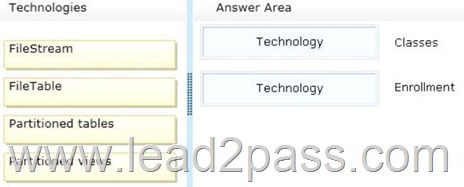
Answer:

Explanation:
* The FileTable feature brings support for the Windows file namespace and compatibility with Windows applications to the file data stored in SQL Server. FileTable lets an application integrate its storage and data management components, and provides integrated SQL Server services – including full-text search and semantic search – over unstructured data and metadata. In other words, you can store files and documents in special tables in SQL Server called FileTables, but access them from Windows applications as if they were stored in the file system, without making any changes to your client applications.
QUESTION 13
You deploy a database by using SQL Server 2014. The database contains a table named Table1.
You need to recommend a solution to track all of the deletions executed on Table1. The solution must minimize the amount of custom code required.
What should you recommend?
A. Change data capture
B. Statistics
C. A trigger
D. Master Data Services
Answer: A
Explanation:
Change data capture is designed to capture insert, update, and delete activity applied to SQL Server tables, and to make the details of the changes available in an easily consumed relational format. The change tables used by change data capture contain columns that mirror the column structure of a tracked source table, along with the metadata needed to understand the changes that have occurred.
QUESTION 14
You have four databases that are accessed by using an Online Transaction Processing (OLTP) application.
The databases are stored on a server named SQL1 that has SQL Server 2014 installed.
You plan to deploy an additional server that has SQL Server 2014 installed.
You need to design a high-availability solution for the databases that meets the following requirements:
– If SQL1 fails, the databases must be available.
– Users must be able to run reports against a secondary copy of the databases.
What should you include in the design?
More than one answer choice may achieve the goal. Select the BEST answer.
A. AlwaysOn availability groups
B. Database mirroring
C. Log shipping
D. Failover Clustering
Answer: A
Explanation:
The AlwaysOn Availability Groups feature is a high-availability and disaster-recovery solution that provides an enterprise-level alternative to database mirroring. Introduced in SQL Server 2012, AlwaysOn Availability Groups maximizes the availability of a set of user databases for an enterprise. An availability group supports a failover environment for a discrete set of user databases, known as availability databases, that fail over together.
QUESTION 15
Drag and Drop Question
You have a server named SQL1 that has SQL Server 2012 installed. SQL1 hosts a database named Database1. Database1 contains a table named Table1. Table1 is partitioned across five filegroups based on the Date field.
The schema of Table1 is configured as shown in the following table.

Table1 contains the indexes shown in the following table.
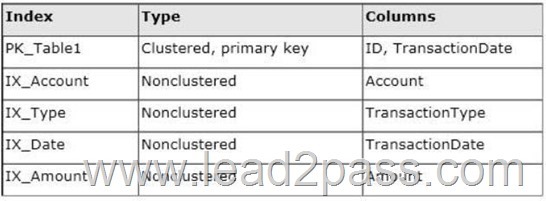
You need to recommend an index strategy to maximize performance for the queries that consume the indexes available to Table1.
Which type of index storage should you recommend?
To answer, drag the appropriate index storage type to the correct index in the answer area.
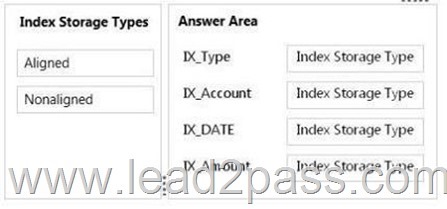
Answer:
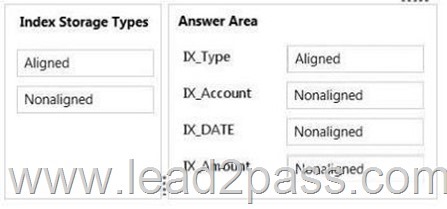
Explanation:
Index Storage Type
* Designing a partitioned index independently (unaligned) of the base table can be useful in the following cases:
/The base table has not been partitioned.
/The index key is unique and it does not contain the partitioning column of the table. / You want the base table to participate in collocated joins with more tables using different join columns.
QUESTION 16
Drag and Drop Question
You plan to deploy SQL Server 2014.
Your company identifies the following monitoring requirements:
– Tempdb must be monitored for insufficient free space.
– Deadlocks must be analyzed by using Deadlock graphs.
You need to identify which feature meets each monitoring requirement.
Which features should you identify?
To answer, drag the appropriate feature to the correct monitoring requirement in the answer area.
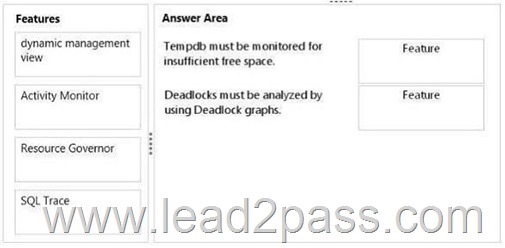
Answer:
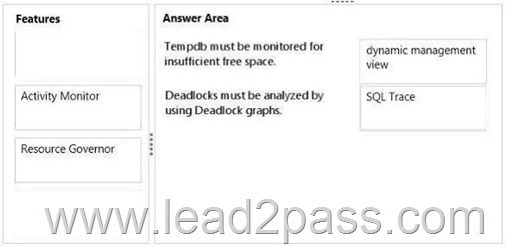
Explanation:
* You can use the sys.dm_db_file_space_usage dynamic management view to monitor the disk space used by the user objects, internal objects, and version stores in the tempdb files. Additionally, to monitor the page allocation or deallocation activity in tempdb at the session or task level, you can use the sys.dm_db_session_space_usage and sys.dm_db_task_space_usage dynamic management views. These views can be used to identify large queries, temporary tables, or table variables that are using a large amount of tempdb disk space.
*
/ Use SQL Server Profiler to identify the cause of a deadlock. A deadlock occurs when there is a cyclic dependency between two or more threads, or processes, for some set of resources within SQL Server. Using SQL Server Profiler, you can create a trace that records, replays, and displays deadlock events for analysis.
/ SQL Server Profiler and SQL Server Management Studio use a deadlock wait-for graph to describe a deadlock. The deadlock wait-for graph contains process nodes, resource nodes, and edges representing the relationships between the processes and the resources.
Reference: Troubleshooting Insufficient Disk Space in tempdb Reference: Analyze Deadlocks with SQL Server Profiler
QUESTION 17
You are troubleshooting an application that runs a query.
The application frequently causes deadlocks.
You need to identify which transaction causes the deadlock.
What should you do? More than one answer choice may achieve the goal. Select the BEST answer.
A. Query the sys.dm_exec_requests dynamic management view.
B. Create a trace in SQL Server Profiler that contains the Deadlock graph event.
C. Query the sys.dm_exec_sessions dynamic management view.
D. Create an extended events session to capture deadlock information.
Answer: D
Explanation:
Troubleshooting deadlocks
You have been receiving reports from users indicating that certain applications are returning deadlock errors. To maximize the effectiveness of troubleshooting these problems, you decide to focus on the deadlocks that are hit most frequently. You create an Extended Events session that:
/ Configures deadlock event tracking for the session.
/ Specifies a target that aggregates based on an identifier for the deadlock.
You run the Extended Events session, and after additional deadlocks are reported you are able to obtain aggregated deadlock information, along with the complete XML deadlock graph for each source. Using this information you are able to pin point the most common deadlocks and start working on a solution.
QUESTION 18
You plan to create a database.
The database will be used by a Microsoft .NET application for a special event that will last for two days.
During the event, data must be highly available.
After the event, the database will be deleted.
You need to recommend a solution to implement the database while minimizing costs.
The solution must not affect any existing applications.
What should you recommend?
More than one answer choice may achieve the goal. Select the BEST answer.
A. SQL Server 2014 Enterprise
B. SQL Server 2014 Standard
C. SQL Azure
D. SQL Server 2014 Express with Advanced Services
Answer: B
Explanation:
Programmability (AMO, ADOMD.Net, OLEDB, XML/A, ASSL) supported by Standard and Enterpirse editions only.
Reference: Features Supported by the Editions of SQL Server 2014
QUESTION 19
Drag and Drop Question
You plan to deploy SQL Server 2014.
You are designing two stored procedures named SP1 and SP2 that have the following requirements:
– Prevent data read by SP1 from being modified by other active processes.
– Prevent SP2 from performing dirty reads.
You need to recommend the isolation level for each stored procedure.
The solution must maximize concurrency.
Which isolation levels should you recommend?
To answer, drag the appropriate isolation level to the correct stored procedure in the answer area.

Answer:

Explanation:
* REPEATABLE READ
This isolation level includes the guarantees given by SNAPSHOT isolation level. In addition, REPEATABLE READ guarantees that for any row that is read by the transaction, at the time the transaction commits the row has not been changed by any other transaction. Every read operation in the transaction is repeatable up to the end of the transaction.
* Committed Read is SQL Server’s default isolation level. It ensures that an operation will never read data another application has changed but not yet committed.
QUESTION 20
You are designing a database named DB1. Changes will be deployed to DB1 every Wednesday night. You need to recommend a strategy to deploy the changes to DB1.
The strategy must meet the following requirements:
– The strategy must not disrupt backup operations.
– DB1 must be unavailable to users while the changes are deployed.
– You must be able to undo quickly the entire operation.
What should you recommend?
More than one answer choice may achieve the goal. Select the BEST answer.
A. Perform a copy-only database backup before the changes are deployed.
If the deployment fails, restore the database to another server and recover the original objects from the restored database.
B. Create a database snapshot.
If the deployment fails, recover the objects from the database snapshot.
C. Create a database snapshot.
If the deployment fails, revert the database to the database snapshot.
D. Perform a full database backup before the changes are deployed.
If the deployment fails, restore the database to another server and recover the original objects from the restored database.
Answer: C
Visit Lead2pass and get the 70-465 exam dumps with PDF and VCE for free. By training the Lead2pass Microsoft 70-465 149q questions, you will pass th exam at the first time.